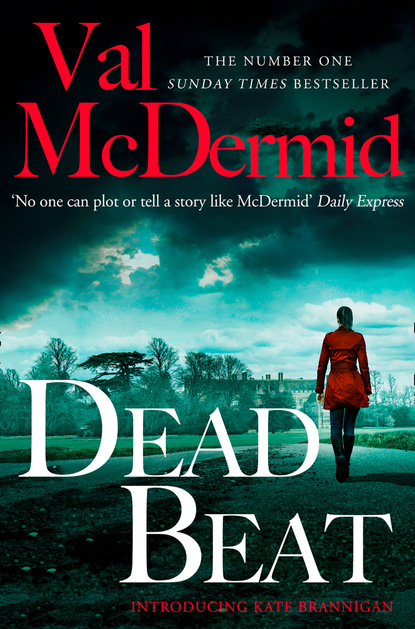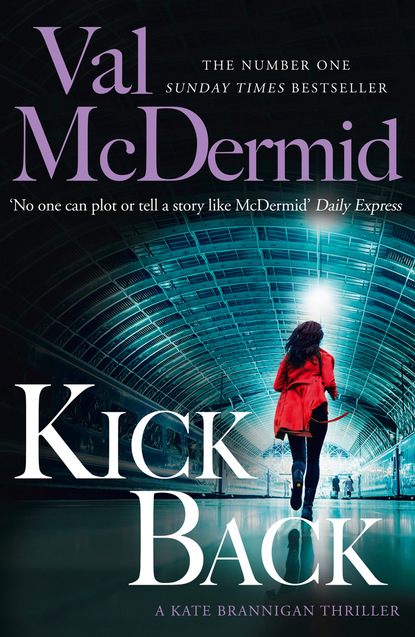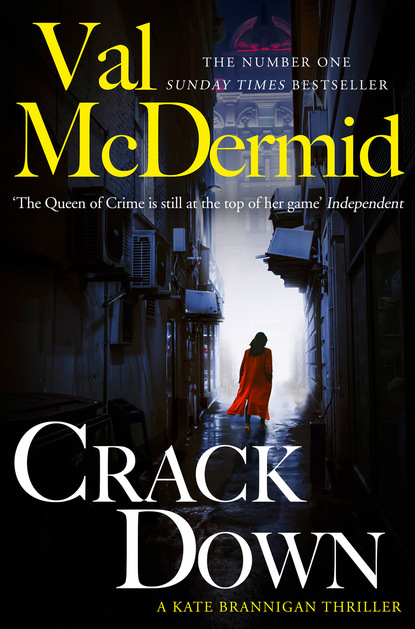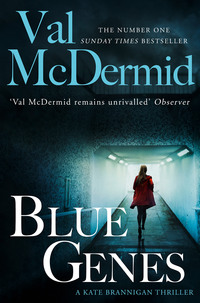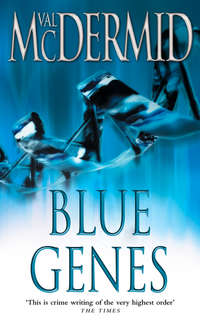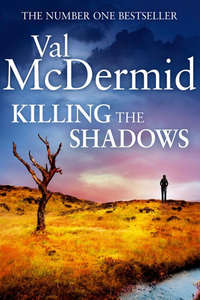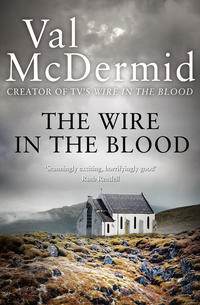
Полная версия
Clean Break

CLEAN BREAK
Val McDermid

Copyright
HarperCollinsPublishers
1 London Bridge Street
London SE1 9GF
www.harpercollins.co.uk
This ebook edition published by HarperCollinsPublishers 2019
First published in Great Britain by HarperCollinsPublishers 1995
Copyright © Val McDermid 1995
Cover design by Micaela Alcaino © HarperCollinsPublishers 2019
Cover photographs © Stephen Mulcahey / Trevillion Images (woman, background), © Shutterstock.com (sky)
Val McDermid asserts the moral right to be identified as the author of this work
A catalogue record for this book is available from the British Library
This is entirely a work of fiction. The names, characters and incidents portrayed in it are the work of the author’s imagination. Any resemblance to actual persons, living or dead, events or localities is entirely coincidental.
All rights reserved under International and Pan-American Copyright Conventions. By payment of the required fees, you have been granted the non-exclusive, non-transferable right to access and read the text of this e-book on-screen. No part of this text may be reproduced, transmitted, down-loaded, decompiled, reverse engineered, or stored in or introduced into any information storage and retrieval system, in any form or by any means, whether electronic or mechanical, now known or hereinafter invented, without the express written permission of HarperCollins e-books
Source ISBN: 9780008344924
Ebook Edition © NOVEMBER 2019 ISBN: 9780007327553
Version: 2019-10-15
Praise for Val McDermid
‘The queen of crime is still at the top of her game’
INDEPENDENT
‘No one can tell a story like she can’
DAILY EXPRESS
‘One of today’s most accomplished crime writers’
LITERARY REVIEW
‘McDermid remains unrivalled’
OBSERVER
‘Incredibly suspenseful’
SUNDAY MIRROR
‘This is crime writing of the very highest order’
THE TIMES
‘A gripping page-turner’
METRO
‘A terrific read’
DAILY TELEGRAPH
Dedication
To Chelsea fans everywhere,
in deepest sympathy;
God knows, you need something to
cheer you up.
Contents
Cover
Title Page
Copyright
Praise for Val McDermid
Dedication
Chapter 1
Chapter 2
Chapter 3
Chapter 4
Chapter 5
Chapter 6
Chapter 7
Chapter 8
Chapter 9
Chapter 10
Chapter 11
Chapter 12
Chapter 13
Chapter 14
Chapter 15
Chapter 16
Chapter 17
Chapter 18
Chapter 19
Chapter 20
Chapter 21
Chapter 22
Chapter 23
Chapter 24
Chapter 25
Chapter 26
Acknowledgements
Keep Reading …
About the Author
By Val McDermid
About the Publisher
1
I don’t know much about art, but I know what I don’t like. I don’t like paintings that go walkabout after I’ve set up the security system. I especially don’t like them when I’ve packed my business partner off to the Antipodes for two months with the calm assurance that I can handle things while he’s gone.
The painting in question was a small Monet. When I say small, I mean in size, not in value. It would barely cover the hole my lover Richard punched in the wall of his living room in a moment of drunken ecstasy when Eric Cantona clinched the double for Manchester United, but it was worth a good dozen times as much as both our adjoining bungalows put together. Which, incidentally, they never will be. The painting depicted an apple tree in blossom and not a lot else. You could tell it was an apple tree; according to our office manager Shelley, that’s because it was painted quite early on in Monet’s career, before his eyesight began to go and his whole world started to look like an Impressionist painting. Imagine, a whole artistic movement emanating from one bloke’s duff eyesight. Amazing what you can learn from the Open University. Shelley started a degree course last year, and what she doesn’t know about the history of art I’m certainly not qualified to uncover. It’s not one of the course options in Teach Yourself Private Dicking.
The Monet in question, called, imaginatively enough, Apple Tree in Blossom, belonged to Henry Naismith, Lord of the Manor of Birchfield with Polver. Henry to his friends, and, thanks to John Major’s classless society, to mere tradespeople like me. There were no airs and graces with Henry, but that didn’t mean he didn’t hide his thoughts and feelings behind his charming façade. That’s how I knew it was serious when I picked up the phone to his perfect vowels that September morning. ‘Kate? Henry Naismith,’ he started. I leaned back in my chair, expecting the usual cheery chat about his recent exploits before we got down to the nuts and bolts. Not today. ‘Can you come over to the house?’ he asked.
I straightened up. This sounded like the kind of start to a Monday morning that makes me wish I’d stayed in bed. ‘When did you have in mind, Henry?’
‘As soon as you can. We ah … we had a burglary in the night and a chap from the police is popping round for more details. He’ll want to know things about the security system that I probably won’t be able to answer, and I’d be awfully grateful if you could take a run over.’ All this barely pausing for breath, never mind giving me the opportunity to ask questions.
I didn’t have to check the diary to know that I had nothing more pressing than routine inquiries into the whereabouts of a company chairman whose directors were rather eager to ask him some questions about the balance sheet. ‘No problem,’ I said. ‘What’s missing?’ I prayed it was going to be the TV and the video.
No such luck. There was silence on the end of the phone. I thought I could hear Henry drawing in a deep breath. ‘The Monet,’ he said tersely.
My stomach clenched. Birchfield Place was the first security system I’d designed and watched installed. My partner Bill Mortensen is the security expert, and he’d checked my work, but it was still down to me. ‘I’m leaving now,’ I said.
I drove out through the southern suburbs to the motorway on automatic pilot. Even the inevitable, ubiquitous roadworks didn’t impinge. I was too busy reviewing Mortensen and Brannigan’s involvement with Henry Naismith. When I’d seen his original appointment in the office diary, I’d thought Shelley was at the wind-up, especially since I’d been having one of my periodic antimonarchy rants only the day before, triggered by the heir to the throne asserting that what was wrong with the country was not enough Shakespeare and smacking of small children. Once I realized the appointment was for real, I’d expected some chinless wonder with the sort of inbred stupidity that’s only found among the aristocracy and the population of isolated mountain villages. I couldn’t have been more wrong, on both counts.
Henry Naismith was in his late twenties, built like an Australian lifeguard with the blonde hair to match and with more than enough chin to provide a boxer with a target. According to Who’s Who, his only listed recreations were sailing and ocean yacht racing, something I could have guessed for myself the first time I saw him. He had sailor’s eyes, always looking beyond me to some distant horizon only he could see. His face was burnished a ruddy brown by wind and sun, apart from the white creases round those dark blue eyes. He’d been educated at Marlborough and New College, Oxford. Even though I’d grown up there, I didn’t think his city of dreaming spires and mine of car factories would give us much in common to reminisce about. He had the same clipped accent as Prince Charles, but in spite of that and everything else, I liked him. I liked anybody who was prepared to get off their backsides and graft. And Henry could graft, no messing. Anyone who tells you yacht racing is a holiday doesn’t know an anchor from a wanker.
The newspaper archive database that we use had coloured in the outline. Henry had inherited his title, a black and white Tudor manor house in Cheshire, a clutch of valuable paintings and not a lot of readies a couple of years before when his parents had been caught in an avalanche in some chic Alpine resort. Henry had been sailing in the Caribbean at the time. Life’s a bitch, and then you marry one. Only Henry hadn’t. Married, that is. He was right up there in the gossip columnists’ lists of eligible bachelors. Maybe not in the top twenty, on account of the lack of dosh, but the good looks and the tasty gaff put him in the running nevertheless.
Henry had come to us precisely because of the serious deficiencies in the cashflow area. Because his father hadn’t anticipated dying at the age of forty-seven, he hadn’t got round to the sort of arrangements the landed gentry usually make to avoid the Exchequer getting their mitts on the widow’s mite. Having done his sums, Henry realized the only way he was going to be able to hang on to the house and the art collection and still spend half the year at the helm of a racing yacht was to bite the bullet and open Birchfield Place to the day-trippers.
The great British public are notoriously sticky-fingered on the stately home circuit. You wouldn’t think it to look at the coach-loads of little old ladies that roll up on bank holidays, but they’ll walk off with anything that isn’t actually nailed down, and one or two things that are. This makes insurance companies even more twitchy than usual when it comes to providing cover, which in turn makes the security business a nice little earner for private investigation agencies like us. These days, security makes up about a quarter of our annual turnover, which is why Bill and I had decided I needed to learn that side of the business.
It’s impossible to make any building impregnable, unless you brick up the doors and windows, which makes it hard to get a decent light to do your petit point. The best you can do is make it obvious that you’ve made it as hard as possible to get in, so the prospective burglar goes away discouraged and turns over the next manor down the road. To make sure I got it right, as well as picking Bill’s brains I’d consulted my old friend Dennis, himself a recovering burglar. ‘You know the one deterrent, Brannigan?’ Dennis had demanded.
‘Heat-seeking thermonuclear missiles?’ I’d hazarded.
‘A dog. You get a big Alsatian, give him the run of the place and your professional thief doesn’t want to know. When I was at it, there wasn’t an alarm system in the world that I wouldn’t have a pop at. But dogs? Forget it.’
Unfortunately, clients aren’t too keen on having Rottweilers running around on their priceless Oriental carpets. They’re too worried about finding dog hairs – or worse – on the Hepplewhite. So Birchfield Place had relied, like most stately homes, on a state-of-the-art mix of hard-wired detectors on doors and windows, passive infrared detectors at all key points and pressure-activated alert pads in front of any items of significance. Given the fail-safes I’d put in place, I couldn’t for the life of me see how anyone could have got through my system undetected without setting off enough bells to drive Quasimodo completely round the twist.
I turned off the motorway and headed into the depths of the leafy Cheshire stockbroker, soap star and football player belt. As usual, I almost missed the gap in the tall hedgerow that marked the end of Birchfield Place’s drive. The trippers’ entrance was round the back, but I had no intention of parking in a field half a mile from the house. I yanked the wheel round just in time and turned on to a narrow ribbon of road curling between fields where placid sheep didn’t even glance up from their chewing as I passed. I always feel slightly edgy out in the country; I don’t know the names of anything and very quickly develop anxiety about where my next meal is coming from. Give me an urban landscape where no sensible sheep would think for even a fleeting moment it might safely graze. The field gave way to thick coppices of assorted trees that looked like they’d been on the planet longer than my Granny Brannigan. Then, suddenly, the drive took a sharp right-hand bend and I shot out of the trees to a full frontal view of Birchfield Place.
Built by some distant Naismith who had done some unmentionable service to his monarch, the house looked as if it should be on a postcard or a jigsaw. The passage of time had skewed its black beams and white panels just enough to make sure no self-respecting building society would grant you a mortgage on it. It never looked real to me.
I pulled up beside an anonymous Ford which I assumed belonged to the police on account of the radio. A peacock screamed in the distance, more shattering to my composure than any amount of midnight sirens. I only knew it was a peacock because Henry had told me the first time one had made me jump out of my skin. Before I could reach out for the ancient bell-pull, the door swung open and Henry smiled apologetically at me. ‘I really appreciate this, Kate,’ he said.
‘All part of the service,’ I said reassuringly. ‘The police here?’
‘An Inspector Mellor from the Art Squad,’ Henry said as he led the way across the inner courtyard to the Great Hall, where the Impressionist paintings hung incongruously. ‘He doesn’t say much.’
We passed through the Hall Porch, whose solid oak door looked like it had taken a few blows from a heavy sledge-hammer. At the door of the Great Hall, I put out a hand to delay Henry. ‘So what exactly happened?’
Henry rubbed his jaw. ‘The alarm woke me. Just before three, according to the clock. I checked the main panel. It said Hall Porch, Great Hall door, Great Hall and pressure pads. I phoned the police to confirm it wasn’t a false alarm, and ran downstairs. When I got to the hall, there was nobody in sight and the Monet was gone. They must have been in and out again in less than five minutes.’ He sighed. ‘They obviously knew what they were looking for.’
‘Didn’t the beeper on the courtyard security lights waken you?’ I asked, puzzled.
Henry looked sheepish. ‘I turned the beeper off. We’ve been having a bit of a problem with foxes, and I got fed up with being wakened up night after night.’ I said nothing. I hoped the look on my face said it for me. ‘I know, I know,’ Henry said. ‘I don’t think Inspector Mellor’s overly impressed either. Shall we?’
I followed him into the hall. It was a surprisingly bright room for the period. It was two storeys high, with a whitewashed vaulted roof and gallery for Blondel unplugged. The wall that gave on to the inner courtyard had a couple of feet of wood panelling above floor level, then it was hundreds of tiny leaded panes of glass to a height of about eight feet. The outer wall’s panelling was about four feet high before it gave way to more windows. I didn’t envy the window cleaner. At the far end was a raised dais where Henry’s distant ancestors had sat and lorded it over the plebs and railed against the iniquities of the window tax. It was around the dais that the paintings hung. A tall, thin man was stooped like a crane over the space where the Monet used to be. As we entered, he turned towards us and fixed me with a glum stare.
Henry performed the introductions while Inspector Mellor and I weighed each other up. He looked more patrician than Henry, with a high forehead over a beaky nose and a small, cupid’s bow mouth. At his request, I ran him through the security arrangements. He nodded noncommittally as he listened, then said, ‘Not a lot more you could have done, short of having CCTV.’
‘Professional job, yeah?’ I said.
‘No doubt about it. They obviously chose their target, cased the place thoroughly, then did a quick in and out. No identifiable forensic traces, according to my colleagues who turned up after the event.’ Mellor looked as depressed as I felt.
‘Does it put you in mind of anyone in particular?’ I asked.
Mellor shrugged. ‘I’ve seen jobs like this, but we haven’t managed an arrest on any of them yet.’
Henry closed his eyes and sighed. ‘Is there any chance of getting my Monet back?’ he asked wearily.
‘If I’m honest, sir, not a lot. Thieves like this only take what they’ve already got a market for,’ Mellor said. ‘Sooner or later, we’ll get a lucky break and we’ll nail them. It could be on this case. What I’d like to do is send a couple of my lads over when your staff are next in. These thieves will have been round the house more than once. It’s just possible one of your attendants noticed repeat visitors.’
‘They’ll be in at half past nine on Thursday,’ Henry said. ‘The house is closed to the public on Mondays, Tuesdays and Wednesdays, excepting bank holidays.’
Mellor turned away and spent a few minutes studying the Boudin, the Renoir and the two Pissarros that flanked the space where the Monet had been. ‘Personally,’ he said softly, ‘I’d have gone for the Boudin.’
Not me. The Monet would have looked much better with my colour scheme. But maybe Inspector Mellor’s living room was blue-based rather than green, cream and peach. While Henry escorted Mellor off the premises, I mooched around the hall, wondering what to do next. Mellor’s plan to interrogate the staff had disposed of the only idea I had for pursuing any kind of investigation. I slumped in the attendant’s chair by the door and stared down the hall at the wires sticking out of the ancient panelling where the Monet had been attached to the alarm system and the wall. Inspiration failed to strike; but then, nothing does in this country any more.
When Henry came back, I forced myself upright and said brightly, ‘Well, Henry, Mellor didn’t sound too optimistic about what the forces of law and order can achieve. Looks like it’s down to me to get your Monet back.’
Henry tugged at the lobe of his ear and looked uncomfortable. ‘Is there much point, Kate?’ he asked. ‘I mean, if the specialists don’t know where to start looking, how can you expect to succeed?’
‘People have a tendency to tell me things they don’t necessarily want to share with the police. And that includes insurance companies. I also have more unorthodox sources of information. I’m sure I can develop leads the police will never encounter.’ It was all true. Well, all except the last sentence.
‘I don’t know, Kate. These are professional thieves. Looking at the state of the porch door, they’re clearly quite comfortable with a considerable degree of violence. I’m not sure I’m entirely happy about you pursuing them,’ he said dubiously.
‘Henry, I might only be five foot three, but I can look after myself,’ I said, trying not to think about the last occasion where I’d told the men in my life the same damn lie. The scar on my head was just a distant twinge when I brushed my hair now, but the scar inside went a lot deeper. I hadn’t exactly lost my bottle; I’d just acquired an overdose of wariness.
‘Besides,’ I carried on, seeing his look of frank disbelief, ‘you’re entitled to the first thirty hours of my time for free, according to your contract.’
‘Ah. Yes. Of course.’ His reserve was nailed firmly in place again, the eyes locked on the middle distance.
‘Apart from anything else, me nosing around will convince your insurance company that you’re not trying it on,’ I added.
His eyes narrowed, like a man who’s seen a bloody great wave heading straight for his bows. ‘Why should they think that?’ he said sharply.
‘It wouldn’t be the first time somebody’s set up their own burglary for the insurance,’ I said. ‘It happens all the time round where I live.’ A frown flickered across Henry’s face. ‘There’s nothing you want to tell me, Henry, is there?’ I added apprehensively.
‘There’s no earthly reason why I should arrange this,’ he said stiffly. ‘The police and the insurance company are welcome to check the books. We’re making a profit here. House admissions are up on last year, the gift shop has increased its turnover by twenty-five per cent and the Great Hall is booked for banquets almost every Saturday between now and February. The only thing I’m concerned about is that I’m due to leave for Australia in three weeks and I’d like the matter resolved by then.’
‘I’d better get weaving, in that case,’ I said mildly.
I drove back to Manchester with a lot on my mind. I don’t like secrets. It’s one of the reasons I became a private eye in the first place. I especially don’t like them when they’re ones my client is keeping from me.
2
The atrium of Fortissimus Insurance told me all I needed to know about where Henry’s massive premiums were going. The company had relocated in Manchester from the City, doubtless tempted by the wodges of cash being handed out by various inner city initiative programmes. They’d opted for a site five minutes’ walk down Oxford Road from the rather less palatial offices of Mortensen and Brannigan. Handy, we’d thought, if they ever needed any freelance investigating, though if they had done, it hadn’t been our door they’d come knocking on. They probably preferred firms with the same steel-and-glass taste in interior decor, and prices to match.
Like a lot of new office complexes in Manchester, Fortissimus had smacked a brand new modern building behind a grandiose Victorian façade. In their case, they’d acquired the front of what had been a rather grand hotel, its marble and granite buffed to a shine more sparkling than its native century had ever seen. The entrance hall retained some of the original character, but the glassed-in atrium beyond the security desk was one hundred per cent fin de quite another siècle. The pair of receptionists had clearly absorbed their customer care course. Their grooming was immaculate, their smiles would have made a crocodile proud, and the mid-Atlantic twang in their ‘Good morning, how may I help you?’ stopped short of making my ears bleed. Needless to say, they were as misleading as the building’s façade. After I’d given them my card, asked for Michael Haroun and told them his department, I still had to kick my heels for ten minutes while they ran their debriefing on the weekend’s romantic encounters, rang Mr Haroun, filled out a visitor’s pass and told me Mr Haroun would be waiting for me at the lift.
I emerged on the fifth floor to find they’d been economical with the truth. There was no Mr Haroun, and no one behind the desk marked ‘Claims Inquiries’ either. Before I could decide which direction to head in, a door down the hallway opened and someone backed out, saying, ‘And I want to compare those other cases. Karen, dig out the files, there’s a love.’
He swivelled round on the balls of his feet and déjà vu swept over me. Confused, I just stood and stared as he walked towards me. When he got closer, he held out his hand and said, ‘Ms Brannigan? Michael Haroun.’
For a moment, I was speechless and paralysed. I must have been gawping like a starving goldfish, for he frowned and said, ‘You are Ms Brannigan?’ Then, suspicion appeared in his liquid sloe eyes. ‘What’s the matter? Am I not what you expected? I can assure you, I am head of the claims division.’


